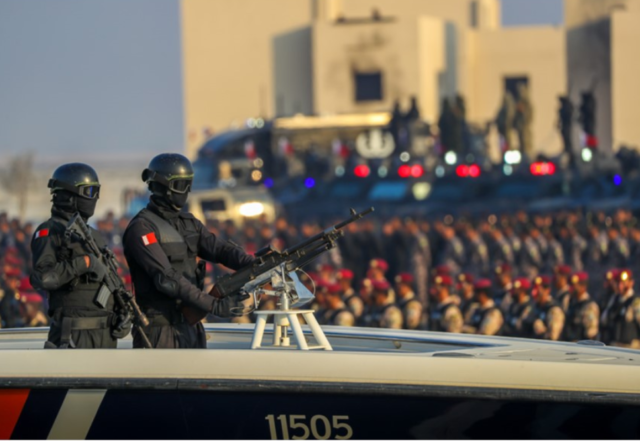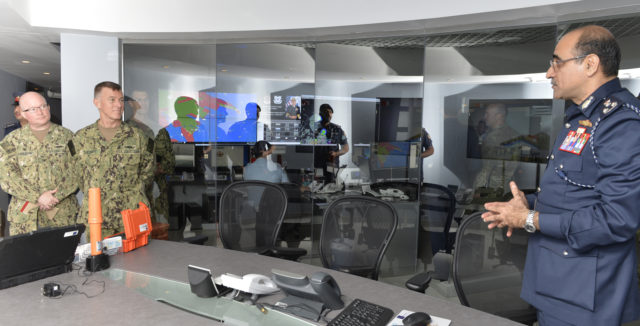
In the aftermath of the Bahraini government’s violent suppression of the 2011 pro-democracy protest movement, the United States (US) temporarily suspended arms sales to the kingdom’s major security and defense institutions. A key military ally, the US purportedly sought to prevent the further use of American weapons and equipment in bloody attacks on peaceful demonstrators. By 2015, the administration of former president Barack Obama would lift most of these restrictions on the Bahrain Defence Force (BDF) and the National Guard, citing nominal reforms that the Bahraini authorities would soon reverse. But, as noted by the Congressional Research Service, the US government has continued to maintain informal holds on weapons transfers to the Ministry of Interior (MOI) police forces, which have also failed Leahy Vetting requirements for certain assistance programs due to evidence of human rights abuses. The only explicit exception to this de facto ban is the Bahraini Coast Guard – the division of the MOI tasked with patrolling the kingdom’s waterways – on the grounds that such a force is unlikely to be deployed against protests or political targets.
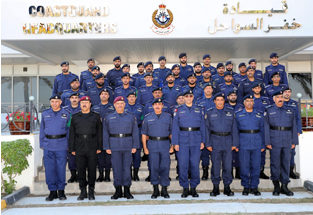
Implicitly, this distinction in US policy is predicated on the assumed existence of strong, bureaucratic barriers between units within the MOI that would prevent the diffusion of equipment, weapons, training, and other assistance. Yet, despite the longevity of both the arms hold and the Coast Guard exception, there is no evidence that such barriers exist. On the contrary, there are clear signs that the various MOI units cooperate routinely and extensively while being integrated into a wider, overlapping security apparatus that includes the military and intelligence bodies. In this way the Coast Guard, with its immunity from American restrictions, may specifically serve as a discrete entry point through which US assistance can be redirected, repurposed, or effectively even laundered for use by the remainder of the MOI.
Already in 2018 the Coast Guard has conducted “Vigilant Guard 6” – its sixth intensive joint exercise with some of the MOI directorates most implicated in severe abuses. Among the participants in the Vigilant Guard actions are the Special Security Force Command (SSFC, also shortened to SFC), the MOI’s elite paramilitary unit regularly deployed at the frontline of protest raids like the lethal May 2017 operation in Diraz; and the General Directorate of Criminal Investigation and Forensic Science (typically referred to by the name of its primary subdivision, the Criminal Investigation Directorate, or CID), arguably the most notorious of all Bahraini security institutions due to its systematic use of arbitrary detention, torture, and enforced disappearance. The Vigilant Guard exercises have also included the various governorate directorates, meaning the regular personnel normally tasked with all manner of standard police work across the kingdom. Training programs conducted by the Coast Guard, which is itself trained by the US, are even less discriminate, consistently enrolling personnel from other MOI divisions like the SSFC as well as the BDF and the Bahrain Naval Force, the National Guard, and even other Gulf Cooperation Council (GCC) countries.
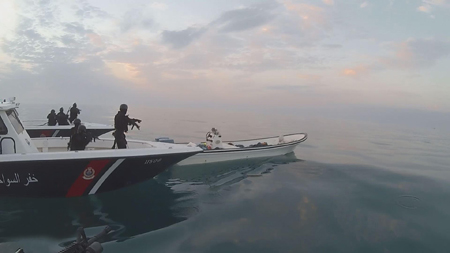
This cooperation is not limited to exercises and training courses. On 9 February 2017, the MOI announced that it had launched a joint operation involving the Coast Guard, the CID, the SSFC, and the National Security Agency (NSA) – Bahrain’s chief intelligence service, and the successor to a former MOI directorate, which was temporarily stripped of its arrest powers over its involvement in torture and extrajudicial killing in 2011. According to the government, the operation intercepted a boat containing ten “escapees from Jau prison [attempting] to flee to Iranian waters,” and Coast Guard personnel exchanged gun fire with the vessel in question, killing three suspects. However independent observers have reported significant inconsistencies in the government’s account of the incident. Though the MOI did not release photographs of the deceased or allow for independent autopsies, leaked images reportedly indicated that at least one body lacked a bullet wound and appeared to show signs of torture. The burial was restricted and the MOI reportedly threatened and prevented family members of the deceased from attending. Additionally, in the days after the shooting, an Instagram account linked to an MOI officer posted messages claiming that the deceased had been physically abused during the operation, as well as threatening to retaliate against activists for reporting on possible human rights violations.
Notably, US-manufactured patrol boats were used in the joint operation, and may have been provided to the Coast Guard as Excess Defense Articles (EDA) – surplus equipment provided via a grant or at a substantially reduced price, a privilege afforded to Bahrain by its status as a Major Non-NATO Ally (MNNA) of the US. On 8 September 2017, the Trump administration approved the most significant new arms deal to Bahrain in years, including a $60.25 million-sale of new 35 Meter Fast Patrol Boats equipped with the MK38 Mod 3 25mm weapon system – a dual-purpose anti-personnel/anti-materiel machine gun that could be utilized in operations like the February 2017 raid or even against land-based targets. Moreover, the MOI’s much-lauded Geographical Security System (GSS) – which “aims to link all operation-related directorates of the Interior Ministry in one system for quick response to daily incidents, crisis management, and security information analysis” – incorporates the US-funded Coastal Surveillance System for the Coast Guard, while further blurring the lines between distinct MOI units. The GSS is also directly connected to the MOI’s National Ambulance Project, which has been used to target wounded protesters and interfere in the provision of impartial medical care. In MOI promotional materials for the GSS, the program is explicitly billed as another means of overcoming any “lack of integration among various MOI departments.”
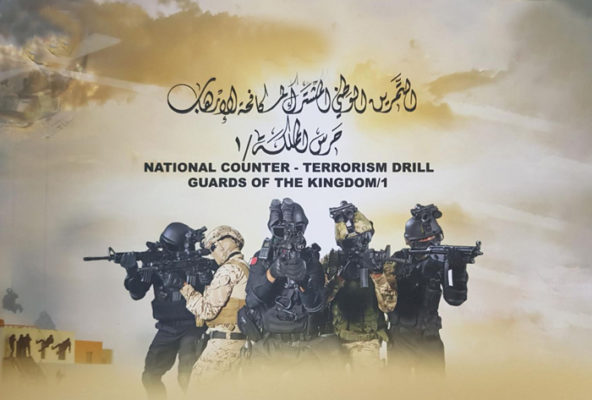
Though it is the most illustrative for exposing the limitations of current US policy, the Coast Guard case is just one example of the deep cooperation – and porous divide – between MOI directorates and the wider Bahraini security establishment. The MOI, BDF, and National Guard – possibly along with the secretive NSA – regularly conduct joint exercises and training programs, particularly focused on purported counterterror objectives. In November 2017, the commander of the BDF’s Royal Guard, Brigadier Sheikh Nasser bin Hamad Al Khalifa – who is himself accused of torturing protesters in 2011 – inaugurated a new joint counterterror exercise entitled “The Kingdom’s Guards 1” by stating that it is “essential to unify concepts, communication, commanding and control methods in Bahrain Defence Force, the Ministry of Interior and the National Guard.” The exercise also included the Ministry of Justice and Islamic Affairs’ Public Prosecution Office, and was reportedly attended by “experts” from the US, the United Kingdom, and France. Similar operations, like the July 2017 “Bahrain Security 1,” focus on honing deep cooperation between just two institutions like the MOI and the National Guard, down to directorate levels. It is clear that the MOI’s involvement in such exercises is not limited to the Coast Guard, with SSFC, standard police, and what looks to be CID personnel appearing in videos and other promotional imagery. Meanwhile, in recent years the MOI’s Royal Academy of Police (RAP) has graduated personnel from the BDF and the NSA; the Coast Guard has trained MOI ambulance teams; and the SSFC has completed counterterror courses with the National Guard, among other joint training initiatives. The emphasis on counterterror cooperation raises a particular danger of coordinated abuse, as Bahrain’s excessively broad anti-terror legislation criminalizes many forms of free speech and assembly, including expressions of peaceful dissent.
For US policy, the risks posed by such close formal and informal connections are further aggravated by Bahrain’s extremely opaque defense procurement and development processes, which are among the least transparent in the world. Anti-corruption watchdog Transparency International has found that Bahrain’s security sector is at the “highest risk category” for corruption due to rampant nepotism, loose restrictions on intermediaries, and the near-total concealment of budgeting and procurement information. Ultimate procurement decisions are the sole purview of the Supreme Defense Council – the country’s highest security authority – and occur in secret, with no records or independent oversight from the National Assembly or the National Audit Court. Furthermore, it is entirely unclear if the Bahraini government has put policies in place to ensure that different security bodies or MOI directorates do not share or transfer equipment and assets, and many institutions disclose little to no information about their specific armaments and systems. The NSA is even said to draw on the MOI’s resources – a vestige of its previous incarnation as the MOI’s General Directorate for State Security Investigations – and there is no open information about its expenditures, existing equipment, or procurement procedures.
In sum, although the US maintains limitations on security assistance to most MOI directorates, the informal restrictions regime fails to properly account for the extensive coordination and inter-service training programs extant within the Bahraini security establishment. Absent unreleased records of thorough end-use monitoring, there is little indication that the MOI – or the security establishment writ large – takes adequate measures to separate US materiel and training from banned units. Rather, there is significant evidence to suggest that virtually all Bahraini security institutions work in close cooperation, and that there are no safeguards to prevent American security assistance from diffusing across MOI directorates. With the Coast Guard excluded even from informal restrictions, and the Bahraini government actively working to soften remaining divisions within the MOI, this glaring loophole in current US policy will only continue to grow.
Sam Jones is a Research Associate at ADHRB


